2022届高考英语复习:动词时态和语态高考考点课件(38张)
文档属性
| 名称 | 2022届高考英语复习:动词时态和语态高考考点课件(38张) | 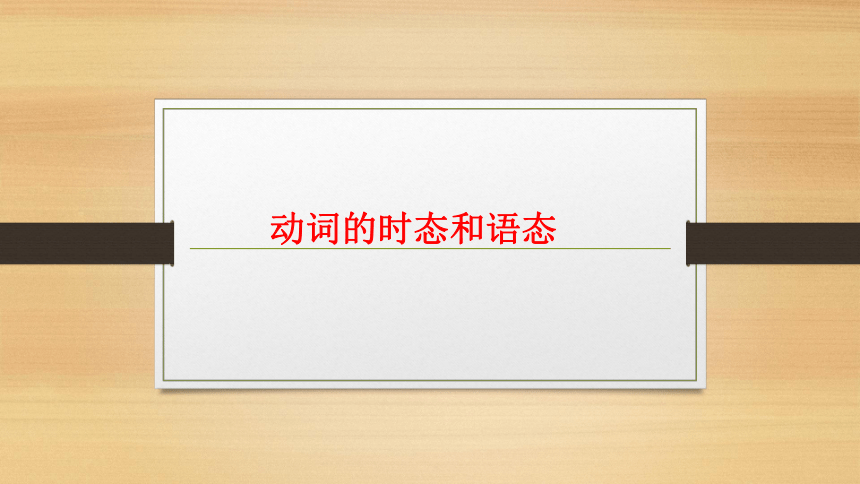 | |
| 格式 | pptx | ||
| 文件大小 | 1.2MB | ||
| 资源类型 | 教案 | ||
| 版本资源 | 通用版 | ||
| 科目 | 英语 | ||
| 更新时间 | 2022-03-16 12:33:04 | ||
图片预览

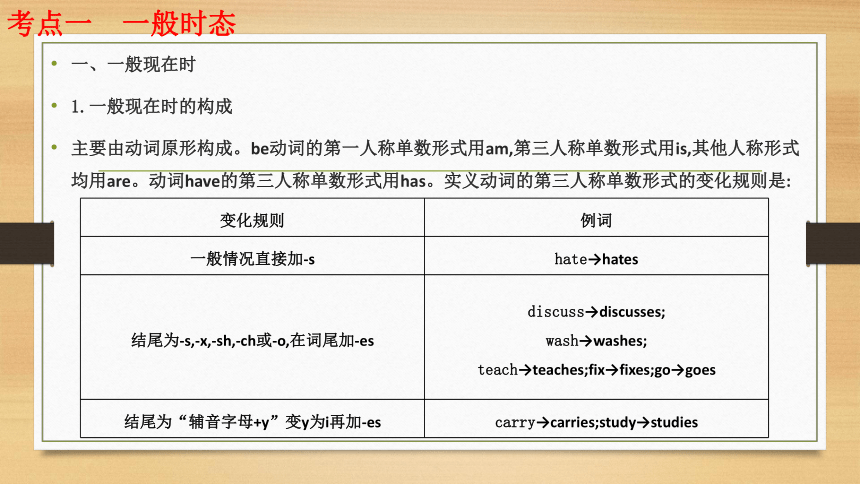
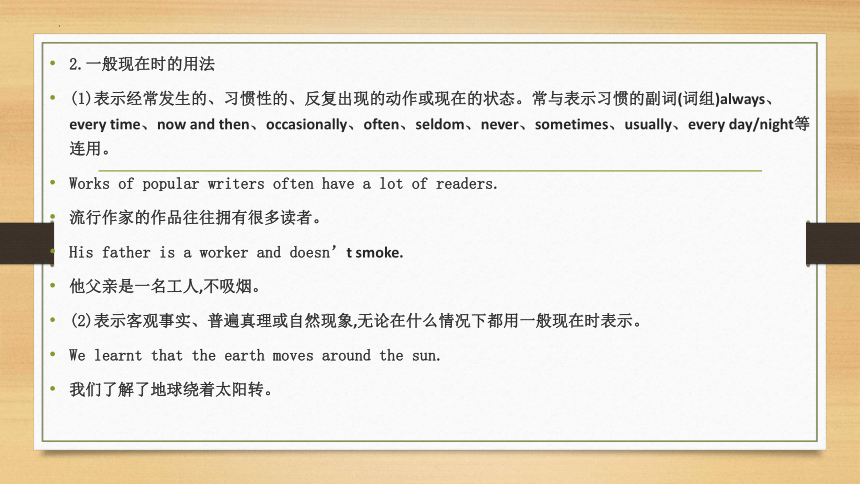

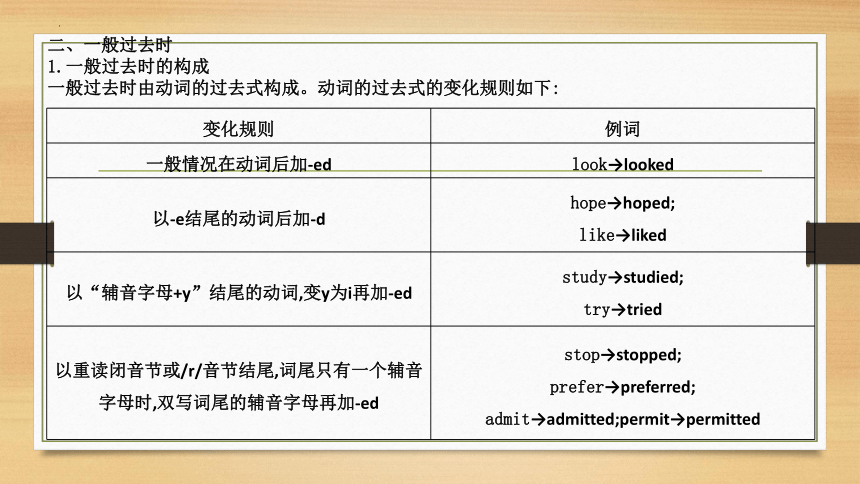
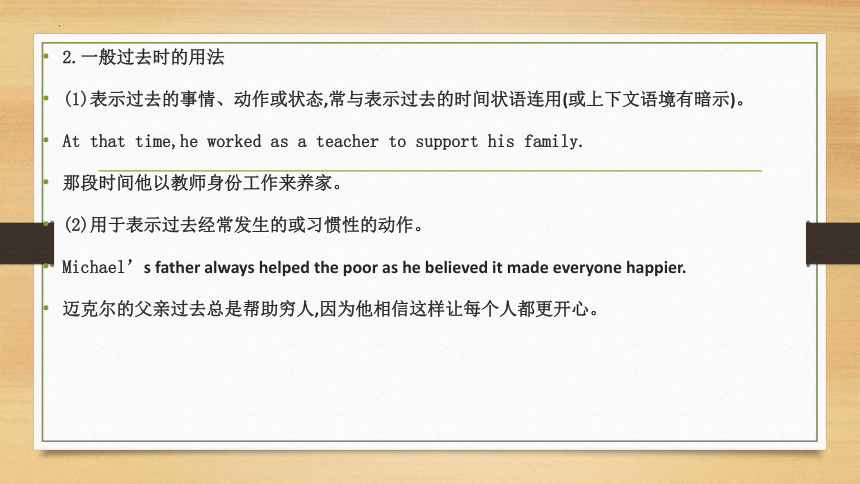
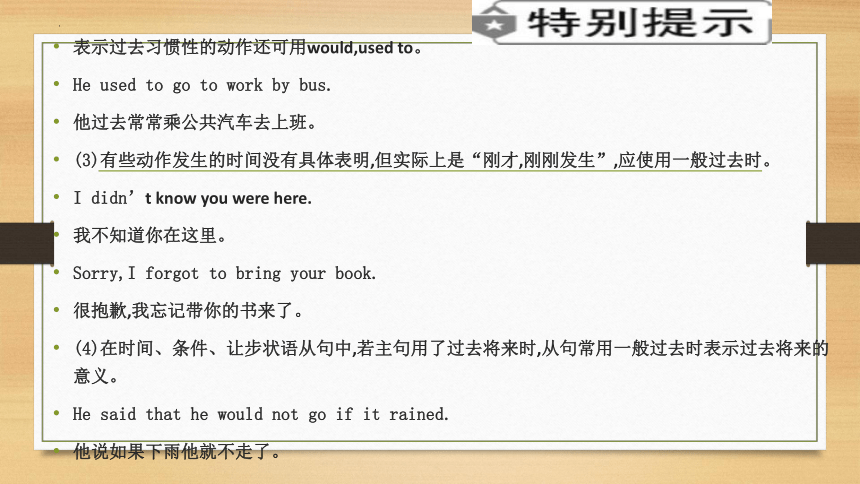
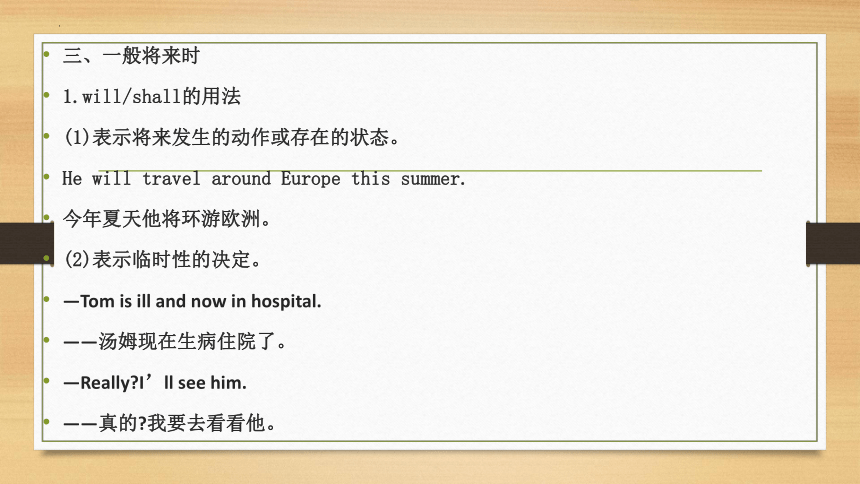

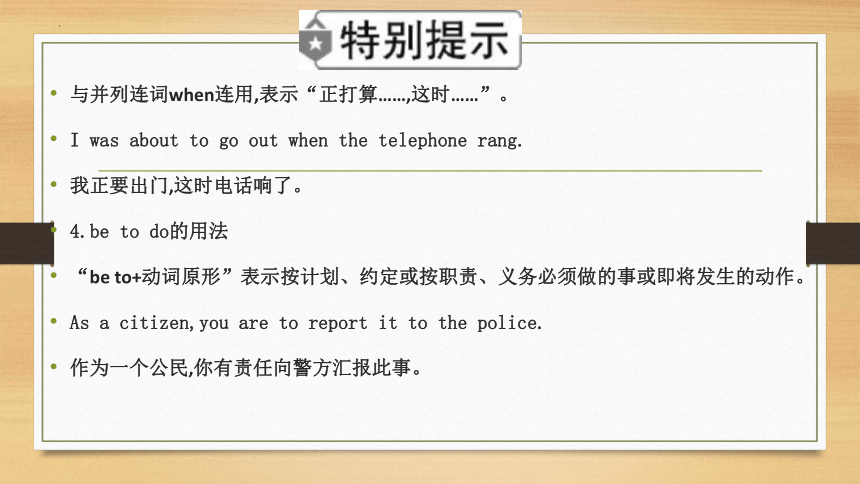
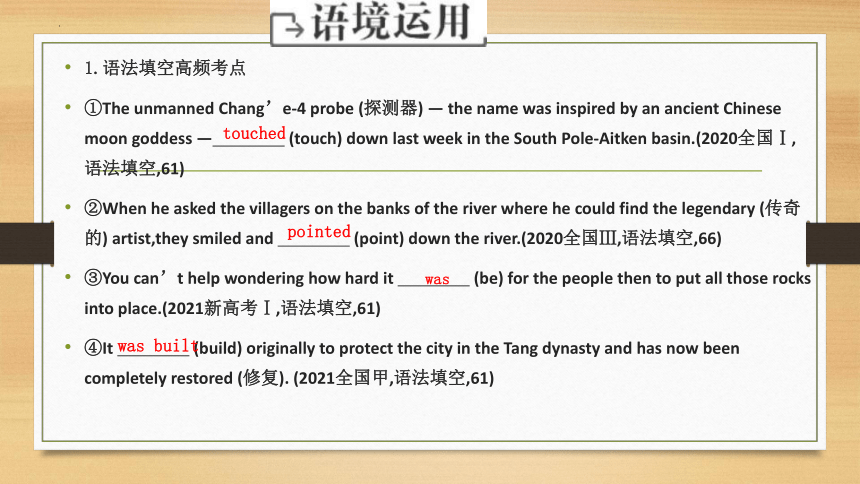
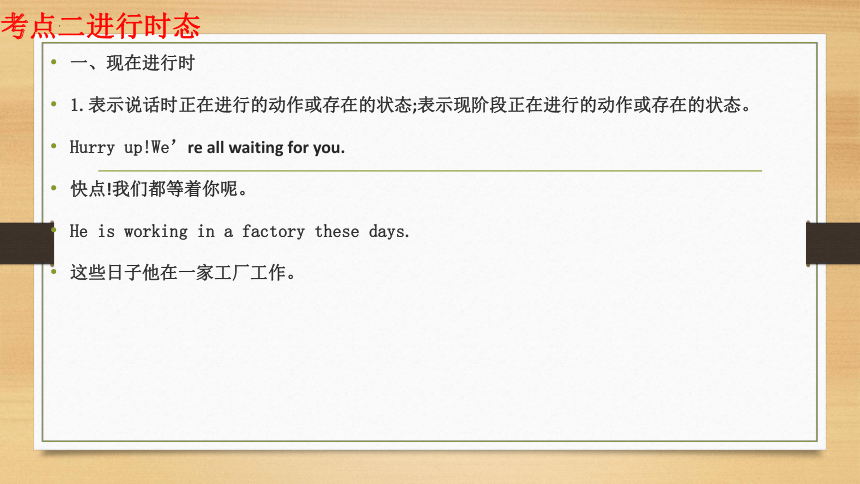
文档简介
(共38张PPT)
动词的时态和语态
一、一般现在时
1.一般现在时的构成
主要由动词原形构成。be动词的第一人称单数形式用am,第三人称单数形式用is,其他人称形式均用are。动词have的第三人称单数形式用has。实义动词的第三人称单数形式的变化规则是:
考点一 一般时态
变化规则 例词
一般情况直接加-s hate→hates
结尾为-s,-x,-sh,-ch或-o,在词尾加-es discuss→discusses;
wash→washes;
teach→teaches;fix→fixes;go→goes
结尾为“辅音字母+y”变y为i再加-es carry→carries;study→studies
2.一般现在时的用法
(1)表示经常发生的、习惯性的、反复出现的动作或现在的状态。常与表示习惯的副词(词组)always、every time、now and then、occasionally、often、seldom、never、sometimes、usually、every day/night等连用。
Works of popular writers often have a lot of readers.
流行作家的作品往往拥有很多读者。
His father is a worker and doesn’t smoke.
他父亲是一名工人,不吸烟。
(2)表示客观事实、普遍真理或自然现象,无论在什么情况下都用一般现在时表示。
We learnt that the earth moves around the sun.
我们了解了地球绕着太阳转。
(3)如果主句是一般将来时,那么在由when、while、before、after、until、as soon as等引导的时间状语从句、if和unless引导的条件状语从句中,可用一般现在时代替一般将来时,表示将来的动作或状态。
The sentence will be very easy to understand when you divide it into three parts.
当你把这个句子分成三部分时,很容易理解。
(4)表示按计划、时刻表规定要发生的动作,但限于少数动词。如begin、come、leave、go、arrive、start、stop、return、open、close等。
The flight takes off at 2:30 every Wednesday and Friday.
每周三和周五航班两点三十分起飞。
变化规则 例词
一般情况在动词后加-ed look→looked
以-e结尾的动词后加-d hope→hoped;
like→liked
以“辅音字母+y”结尾的动词,变y为i再加-ed study→studied;
try→tried
以重读闭音节或/r/音节结尾,词尾只有一个辅音字母时,双写词尾的辅音字母再加-ed stop→stopped;
prefer→preferred;
admit→admitted;permit→permitted
二、一般过去时
1.一般过去时的构成
一般过去时由动词的过去式构成。动词的过去式的变化规则如下:
2.一般过去时的用法
(1)表示过去的事情、动作或状态,常与表示过去的时间状语连用(或上下文语境有暗示)。
At that time,he worked as a teacher to support his family.
那段时间他以教师身份工作来养家。
(2)用于表示过去经常发生的或习惯性的动作。
Michael’s father always helped the poor as he believed it made everyone happier.
迈克尔的父亲过去总是帮助穷人,因为他相信这样让每个人都更开心。
表示过去习惯性的动作还可用would,used to。
He used to go to work by bus.
他过去常常乘公共汽车去上班。
(3)有些动作发生的时间没有具体表明,但实际上是“刚才,刚刚发生”,应使用一般过去时。
I didn’t know you were here.
我不知道你在这里。
Sorry,I forgot to bring your book.
很抱歉,我忘记带你的书来了。
(4)在时间、条件、让步状语从句中,若主句用了过去将来时,从句常用一般过去时表示过去将来的意义。
He said that he would not go if it rained.
他说如果下雨他就不走了。
三、一般将来时
1.will/shall的用法
(1)表示将来发生的动作或存在的状态。
He will travel around Europe this summer.
今年夏天他将环游欧洲。
(2)表示临时性的决定。
—Tom is ill and now in hospital.
——汤姆现在生病住院了。
—Really I’ll see him.
——真的 我要去看看他。
2.be going to的用法
(1)表示按计划、打算做某事。计划可能用时较长,计划得比较正式、周密。
He is going to make a speech on TV this evening.
他今晚将在电视上发表演讲。
(2)表示根据现在的迹象,对未来进行推测。
Look at the dark clouds.It’s going to rain.
看这乌云。要下雨了。
3.be about to的用法
“be about to+动词原形”表示正要或即将要做某事,该结构不与表示将来的具体时间状语连用。
The train is about to start.
火车就要发车了。
与并列连词when连用,表示“正打算……,这时……”。
I was about to go out when the telephone rang.
我正要出门,这时电话响了。
4.be to do的用法
“be to+动词原形”表示按计划、约定或按职责、义务必须做的事或即将发生的动作。
As a citizen,you are to report it to the police.
作为一个公民,你有责任向警方汇报此事。
1.语法填空高频考点
①The unmanned Chang’e-4 probe (探测器) — the name was inspired by an ancient Chinese moon goddess — (touch) down last week in the South Pole-Aitken basin.(2020全国Ⅰ,语法填空,61)
②When he asked the villagers on the banks of the river where he could find the legendary (传奇的) artist,they smiled and (point) down the river.(2020全国Ⅲ,语法填空,66)
③You can’t help wondering how hard it (be) for the people then to put all those rocks into place.(2021新高考Ⅰ,语法填空,61)
④It (build) originally to protect the city in the Tang dynasty and has now been completely restored (修复). (2021全国甲,语法填空,61)
touched
pointed
was
was built
一、现在进行时
1.表示说话时正在进行的动作或存在的状态;表示现阶段正在进行的动作或存在的状态。
Hurry up!We’re all waiting for you.
快点!我们都等着你呢。
He is working in a factory these days.
这些日子他在一家工厂工作。
考点二进行时态
2.表示近期特定的安排或计划。
I am meeting Mr.Wang tonight.
我今晚要会见王先生。
3.严格按照时间表发生的表“起、止”动作的动词或表位置转移的动词可用进行时代替将来时。这样的动词有go、come、start、leave、open、arrive、begin、return等。
Tom is arriving in a few hours.
再过几个小时汤姆就到了。
不宜用现在进行时的常见动词:
(1)表示心理状态、情感的动词:like、love、hate、care、remember、believe、want、mind、wish、agree、mean、need等。
(2)表示存在状态的动词:appear、exist、lie、remain、seem等。
(3)表示行为结果的动词:allow、accept、permit、promise、admit、complete等。
(4)表示感官的动词:see、hear、notice、feel、smell、sound、taste、look等。
二、过去进行时
1.表示过去某一时刻正在进行的动作或某动作在过去某一阶段内发生或频繁发生。
—Did you catch what I said
——你听见我说的话了吗
—Sorry.I was answering a text message just now.
——对不起,我刚才在回短信。
—Have you finished reading Jane Eyre
——你读完《简·爱》了吗
—No,I was doing my homework all day yesterday.
——没有,我昨天一整天都在做作业。
2.过去的某一动作发生时另一动作正在进行,其中的持续性动作用过去进行时,短暂性动作用一般过去时。
I was having dinner when you phoned.
你打电话时我正在吃饭。
三、将来进行时
表示将来某个时刻或阶段正在发生的动作或存在的状态。将来进行时常与一些标志性的时间状语连用,这些常见的标志性状语有at this time tomorrow、from 1:30 to 4:30 the day after tomorrow等。
I’ll be flying to Beijing at two o’clock this afternoon.
今天下午两点钟我将正飞往北京。
变化规则 例词
一般在词尾直接加-ing ask→asking
以不发音的e结尾的动词,去e再加-ing write→writing;take→
taking;face→facing
以重读闭音节结尾,且末尾只有一个辅音字母,双写该辅音字母再加-ing cut→cutting;begin→
beginning;swim→
swimming
以-ie结尾的动词,变-ie为y再加-ing lie→lying;die→dying
现在进行时由“am/is/are+现在分词”构成;过去进行时由“was/were+现在分词”构成;
将来进行时由“will/shall+be+现在分词”构成。
现在分词的变化规则如下:
1.语法填空高频考点
①Compared with the life we (live) on the earth now,the future life on Mars will be totally different.
②One day,when I was drawing diagrams on the balcony and he (bathe) inside,the volcano erupted unexpectedly.
2.短文改错高频考点
①The water supply has been cut off temporarily because the workers were repairing one of the main pipes.
②Jim watching a late-night film at home when,right in the middle of a thrilling scene,the television went blank.
are living
was bathing
①将were改为are
②在watching前加was
四、现在完成进行时的用法
1.常用来表示开始于过去某个时间、一直持续到现在并且会继续进行下去的动作。
I’m very tired.I have been checking the students’ papers all the morning.
我很累。我整个上午都在批改学生的试卷。
2.表示到目前为止的一段时间里一直在反复进行的动作。
I have been calling him many times this morning,but there’s no answer.
今天上午我给他打了很多次电话,但目前一直没有收到答复。
现在完成时与现在完成进行时的区别:
现在 完成时 表示过去开始的一个动作到目前为止已经完成,体现动作的结果
现在完 成进行时 表示过去开始的一个动作到目前为止仍在进行,甚至仍将继续
I’ve read The Old Man and the Sea.
我已经读过《老人与海》了。(已经完成)
I have been reading The Old Man and the Sea these days.
这些天我一直在读《老人与海》。(仍在进行甚至仍将继续)
1.语法填空高频考点
—Tony,why are your eyes red
—I (cut) up peppers for the last five minutes.
2.短文改错高频考点
She had been writing the letter since four o’clock in the afternoon.
have been cutting
将had改为has
一、现在完成时
现在完成时常与以下时间状语连用:so far、recently、lately、once/twice/ three...times、before、ever、by now、in the last/past few years、over a long time、up to now、yet、already、just、since。现在完成时主要用于以下几种情况:
1.表示过去已经发生或完成的某一动作对现在造成的影响。
—Look!Somebody has cleaned the sofa.
——看!已经有人擦了沙发了。
—Well,it wasn’t me.I didn’t do it.
——哦,不是我,我没有擦。
考点三 完成时态
2.表示从过去某一时间开始一直持续到现在,也可能持续下去的动作或状态。
He has worked here for over 20 years.
他已经在这儿工作20多年了。
They have been good friends since they met at a meeting.
他们自从在一次会议上相遇就成了好朋友。
3.下列句型中常用现在完成时。
(1)It is (has been)+一段时间+since 从句
This (That/It) is the first (second...) time+that从句(从句用现在完成时)
This (That/It) is the best/finest/most interesting...+that从句(从句用现在完成时)
It’s/It has been 5 years since we last met.
自从我们上次相遇到现在已经5年了。
This is the first time that we have seen a film in the cinema together as a family.
这是我们一家人第一次一起在电影院里看电影。
This is the best film that I’ve ever seen.
这是我看过的最好的电影。
(2)在条件、时间、让步状语从句中,表示将来某时已完成的动作。
Please return the book to me when you have finished it.
你看完这本书后请还给我。
二、过去完成时
1.过去某一时间或动作前已完成的动作或存在的状态。过去某一时间的动作或状态持续到过去另一时间,还可能持续下去。
The train had left when I got to the station.
我到车站时火车已经开走了。
2.用在hardly/scarcely/rarely...when...和no sooner...than...句型中,主句常用过去完成时,表示“一……就……;刚……就……”。
I had hardly (no sooner) got home when (than) the rain poured down.=Hardly (No sooner) had I got home when (than) the rain poured down.
我刚到家雨就倾盆而下。
3.有些动词有时用过去完成时表示过去未曾实现的愿望或打算。这类动词常见的有:hope、plan、mean、expect、intend、suppose、want、think等。
I had expected to pass the test.
我原认为可以通过这次考试。
1.语法填空高频考点
①By about 6000 BC,people (discover) the best crops to grow and animals to raise.(2020浙江7月高考,语法填空,61)
②Irene said,“I don’t see any reason to give up work.I love coming here and seeing my family and all the friends I (make) over the years...”(2019全国Ⅱ,语法填空,66)
had discovered
have made
1.被动语态的构成
被动语态由“be+过去分词”构成,be动词有人称、数和时态的变化。各种时态的被动语态形式如下(以动词do为例):
考点四 被动语态
现在时 过去时 将来时 过去将来时
一 般 is/am/ are done was/were done will/shall be done would/
should
be done
进 行 is/am/are being done was/were being done \ \
完 成 have/has been done had been done will/shall have been done would/
should
have been
done
2.被动语态的基本用法
(1)不知道谁是动作的执行者,或没有必要指明谁是动作的执行者。
—The window is dirty.
——窗户脏了。
—I know.It hasn’t been cleaned for weeks.
——我知道。好几周没擦了。
①有些及物动词(短语)不能用于被动语态。常见的有:have有;cost花费;lack缺少;own拥有;belong to属于;take part in参加。
②不及物动词(短语)不能用于被动语态。常见的有:happen/take place/occur发生;remain剩下;break out爆发;last持续;come out出版;come up被提出;lose heart失去信心;date from/back to追溯到;run out用完。
(2)需要强调或突出动作的承受者或事件本身。
All the employees except the manager are encouraged to work online at home.
除了经理以外,所有的雇员都被鼓励在家网上办公。
“get+过去分词”也可以表示被动,此结构比较口语化。
She got married last week.
她上周结婚了。
The patient got treated once a week.
那位病人一周得到一次治疗。
3.主动形式表示被动意义的结构
(1)英语中有很多动词,如break、catch、clean、drive、look、open、sell、read、write、wash等,当它们被用作不及物动词来描述主语特征时,常用其主动形式表达被动意义,主语通常是物;在这种情况下,常常和easily、well等副词连用。
The sign reads as follows.
这牌子告示如下。
The machine runs well.
这种机器运转良好。
(2)当系动词feel、sound、taste、look、smell、appear、seem、turn、stay、grow、keep等+形容词/名词构成系表结构时,无被动形式,常常以主动形式表示被动意义。
Your reason sounds reasonable.
你的理由听起来合理。
(3)在need、want、require、deserve、bear等动词、worth等形容词的后面,动名词用主动形式表示被动意义,其含义相当于动词不定式的被动形式。
The house needs repairing/to be repaired.
这所房子需要修理。
The film is really worth seeing.
这部电影的确值得一看。
(4)在某些“主语(人/物)+be+形容词+不定式”中不定式的主动形式表达被动意义。这些形容词有nice、easy、fit、hard、difficult、important、impossible、pleasant、interesting等。
The problem is difficult to work out.(可看作to work out前省略了for me)
这道题很难计算出。
Do you think the water is safe to drink
你认为这水喝着安全吗
(5)be to rent/blame也属于主动形式表被动意义。
Who is to blame for the mistake
这个错误应该归咎于谁
1.语法填空高频考点
The artist was sure he would (choose),but when he presented his masterpiece to the emperor’s chief minister,the old man laughed.(2020全国Ⅲ,语法填空,63)
2.短文改错高频考点
①This morning,I got an email from the library.It said the book I reserved was ready to be picking up.
②Shakespeare’s play Hamlet has made into at least ten different films over the past years.
be chosen
①将picking改为picked
②在made前加been
Ⅰ.单句语法填空
1.And,as more children were born,more food (need).(2020浙江7月高考,语法填空,59)
2.New methods (mean) that fewer people worked in farming.(2020浙江7月高考,语法填空,65)
3.The parts of a museum open to the public (call) galleries or rooms.(2020 新高考Ⅰ,语法填空,40)
4.The 80,000 objects collected by Sir Hans Sloane,for example, (form) the core collection of the British Museum that opened in 1759.(2020新高考Ⅰ,语法填空,38)
5.Picking up her “Lifetime Achievement” award,proud Irene (declare) she had no plans to retire from her 36-year-old business.(2019全国Ⅱ,语法填空,64)
was needed
meant
are called
formed
declared
6.Our hosts shared many of their experiences and (recommend) wonderful places to eat,shop,and visit.(2019全国Ⅲ,语法填空,65)
7.We (hire) our bikes from the rental place at the South Gate.My bike was old and shaky but did the job.(2021全国甲,语法填空,46)
8.On the first day of my first grade,I stood by the door with butterflies in my stomach.I (voice) my biggest concern to my mother,“How will I make friends ” (2019北京,语法填空,1)
9.Research on the question (suggest) that,for most students,it doesn’t.(2019北京,语法填空,7)
10.I don’t know if he will come.If he (come),I’ll let you know.
recommended
hired
voiced
suggests/suggested/has suggested
comes
Ⅱ.单句语法改错
1.One was that I was amazed at the fact that...And the other is that I wanted to help people in need.(2019全国Ⅱ,短文改错)
2.Though it may appear simple, it required a lot of ideas and efforts.(2019全国Ⅲ,短文改错)
3.During my last winter holiday, I went to the countryside with my father to visit my grandparents. I find a big change there.(2018全国Ⅰ,短文改错)
4.However,with the world’s population increasing rapidly, overfishing had become a serious problem.
5.When I got to the hospital, I had told the nurses to put me to sleep because of the pain.
6.Casita Verde was considered an experiential eco-education centre,and showcases the best practices for sustainable living and alternative energies.
7.Since 2010,Washed Ashore volunteers collected 38,000 pounds of plastic trash from more than 3,000 miles of beaches.
8.A tiny gratefulness can give us a lasting positive mood, which required our consciousness and gratefulness.
将is改为was
将required改为requires
将find改为found
将had改为has
去掉had
将was改为is
在collected前面加have
将required改为requires
动词的时态和语态
一、一般现在时
1.一般现在时的构成
主要由动词原形构成。be动词的第一人称单数形式用am,第三人称单数形式用is,其他人称形式均用are。动词have的第三人称单数形式用has。实义动词的第三人称单数形式的变化规则是:
考点一 一般时态
变化规则 例词
一般情况直接加-s hate→hates
结尾为-s,-x,-sh,-ch或-o,在词尾加-es discuss→discusses;
wash→washes;
teach→teaches;fix→fixes;go→goes
结尾为“辅音字母+y”变y为i再加-es carry→carries;study→studies
2.一般现在时的用法
(1)表示经常发生的、习惯性的、反复出现的动作或现在的状态。常与表示习惯的副词(词组)always、every time、now and then、occasionally、often、seldom、never、sometimes、usually、every day/night等连用。
Works of popular writers often have a lot of readers.
流行作家的作品往往拥有很多读者。
His father is a worker and doesn’t smoke.
他父亲是一名工人,不吸烟。
(2)表示客观事实、普遍真理或自然现象,无论在什么情况下都用一般现在时表示。
We learnt that the earth moves around the sun.
我们了解了地球绕着太阳转。
(3)如果主句是一般将来时,那么在由when、while、before、after、until、as soon as等引导的时间状语从句、if和unless引导的条件状语从句中,可用一般现在时代替一般将来时,表示将来的动作或状态。
The sentence will be very easy to understand when you divide it into three parts.
当你把这个句子分成三部分时,很容易理解。
(4)表示按计划、时刻表规定要发生的动作,但限于少数动词。如begin、come、leave、go、arrive、start、stop、return、open、close等。
The flight takes off at 2:30 every Wednesday and Friday.
每周三和周五航班两点三十分起飞。
变化规则 例词
一般情况在动词后加-ed look→looked
以-e结尾的动词后加-d hope→hoped;
like→liked
以“辅音字母+y”结尾的动词,变y为i再加-ed study→studied;
try→tried
以重读闭音节或/r/音节结尾,词尾只有一个辅音字母时,双写词尾的辅音字母再加-ed stop→stopped;
prefer→preferred;
admit→admitted;permit→permitted
二、一般过去时
1.一般过去时的构成
一般过去时由动词的过去式构成。动词的过去式的变化规则如下:
2.一般过去时的用法
(1)表示过去的事情、动作或状态,常与表示过去的时间状语连用(或上下文语境有暗示)。
At that time,he worked as a teacher to support his family.
那段时间他以教师身份工作来养家。
(2)用于表示过去经常发生的或习惯性的动作。
Michael’s father always helped the poor as he believed it made everyone happier.
迈克尔的父亲过去总是帮助穷人,因为他相信这样让每个人都更开心。
表示过去习惯性的动作还可用would,used to。
He used to go to work by bus.
他过去常常乘公共汽车去上班。
(3)有些动作发生的时间没有具体表明,但实际上是“刚才,刚刚发生”,应使用一般过去时。
I didn’t know you were here.
我不知道你在这里。
Sorry,I forgot to bring your book.
很抱歉,我忘记带你的书来了。
(4)在时间、条件、让步状语从句中,若主句用了过去将来时,从句常用一般过去时表示过去将来的意义。
He said that he would not go if it rained.
他说如果下雨他就不走了。
三、一般将来时
1.will/shall的用法
(1)表示将来发生的动作或存在的状态。
He will travel around Europe this summer.
今年夏天他将环游欧洲。
(2)表示临时性的决定。
—Tom is ill and now in hospital.
——汤姆现在生病住院了。
—Really I’ll see him.
——真的 我要去看看他。
2.be going to的用法
(1)表示按计划、打算做某事。计划可能用时较长,计划得比较正式、周密。
He is going to make a speech on TV this evening.
他今晚将在电视上发表演讲。
(2)表示根据现在的迹象,对未来进行推测。
Look at the dark clouds.It’s going to rain.
看这乌云。要下雨了。
3.be about to的用法
“be about to+动词原形”表示正要或即将要做某事,该结构不与表示将来的具体时间状语连用。
The train is about to start.
火车就要发车了。
与并列连词when连用,表示“正打算……,这时……”。
I was about to go out when the telephone rang.
我正要出门,这时电话响了。
4.be to do的用法
“be to+动词原形”表示按计划、约定或按职责、义务必须做的事或即将发生的动作。
As a citizen,you are to report it to the police.
作为一个公民,你有责任向警方汇报此事。
1.语法填空高频考点
①The unmanned Chang’e-4 probe (探测器) — the name was inspired by an ancient Chinese moon goddess — (touch) down last week in the South Pole-Aitken basin.(2020全国Ⅰ,语法填空,61)
②When he asked the villagers on the banks of the river where he could find the legendary (传奇的) artist,they smiled and (point) down the river.(2020全国Ⅲ,语法填空,66)
③You can’t help wondering how hard it (be) for the people then to put all those rocks into place.(2021新高考Ⅰ,语法填空,61)
④It (build) originally to protect the city in the Tang dynasty and has now been completely restored (修复). (2021全国甲,语法填空,61)
touched
pointed
was
was built
一、现在进行时
1.表示说话时正在进行的动作或存在的状态;表示现阶段正在进行的动作或存在的状态。
Hurry up!We’re all waiting for you.
快点!我们都等着你呢。
He is working in a factory these days.
这些日子他在一家工厂工作。
考点二进行时态
2.表示近期特定的安排或计划。
I am meeting Mr.Wang tonight.
我今晚要会见王先生。
3.严格按照时间表发生的表“起、止”动作的动词或表位置转移的动词可用进行时代替将来时。这样的动词有go、come、start、leave、open、arrive、begin、return等。
Tom is arriving in a few hours.
再过几个小时汤姆就到了。
不宜用现在进行时的常见动词:
(1)表示心理状态、情感的动词:like、love、hate、care、remember、believe、want、mind、wish、agree、mean、need等。
(2)表示存在状态的动词:appear、exist、lie、remain、seem等。
(3)表示行为结果的动词:allow、accept、permit、promise、admit、complete等。
(4)表示感官的动词:see、hear、notice、feel、smell、sound、taste、look等。
二、过去进行时
1.表示过去某一时刻正在进行的动作或某动作在过去某一阶段内发生或频繁发生。
—Did you catch what I said
——你听见我说的话了吗
—Sorry.I was answering a text message just now.
——对不起,我刚才在回短信。
—Have you finished reading Jane Eyre
——你读完《简·爱》了吗
—No,I was doing my homework all day yesterday.
——没有,我昨天一整天都在做作业。
2.过去的某一动作发生时另一动作正在进行,其中的持续性动作用过去进行时,短暂性动作用一般过去时。
I was having dinner when you phoned.
你打电话时我正在吃饭。
三、将来进行时
表示将来某个时刻或阶段正在发生的动作或存在的状态。将来进行时常与一些标志性的时间状语连用,这些常见的标志性状语有at this time tomorrow、from 1:30 to 4:30 the day after tomorrow等。
I’ll be flying to Beijing at two o’clock this afternoon.
今天下午两点钟我将正飞往北京。
变化规则 例词
一般在词尾直接加-ing ask→asking
以不发音的e结尾的动词,去e再加-ing write→writing;take→
taking;face→facing
以重读闭音节结尾,且末尾只有一个辅音字母,双写该辅音字母再加-ing cut→cutting;begin→
beginning;swim→
swimming
以-ie结尾的动词,变-ie为y再加-ing lie→lying;die→dying
现在进行时由“am/is/are+现在分词”构成;过去进行时由“was/were+现在分词”构成;
将来进行时由“will/shall+be+现在分词”构成。
现在分词的变化规则如下:
1.语法填空高频考点
①Compared with the life we (live) on the earth now,the future life on Mars will be totally different.
②One day,when I was drawing diagrams on the balcony and he (bathe) inside,the volcano erupted unexpectedly.
2.短文改错高频考点
①The water supply has been cut off temporarily because the workers were repairing one of the main pipes.
②Jim watching a late-night film at home when,right in the middle of a thrilling scene,the television went blank.
are living
was bathing
①将were改为are
②在watching前加was
四、现在完成进行时的用法
1.常用来表示开始于过去某个时间、一直持续到现在并且会继续进行下去的动作。
I’m very tired.I have been checking the students’ papers all the morning.
我很累。我整个上午都在批改学生的试卷。
2.表示到目前为止的一段时间里一直在反复进行的动作。
I have been calling him many times this morning,but there’s no answer.
今天上午我给他打了很多次电话,但目前一直没有收到答复。
现在完成时与现在完成进行时的区别:
现在 完成时 表示过去开始的一个动作到目前为止已经完成,体现动作的结果
现在完 成进行时 表示过去开始的一个动作到目前为止仍在进行,甚至仍将继续
I’ve read The Old Man and the Sea.
我已经读过《老人与海》了。(已经完成)
I have been reading The Old Man and the Sea these days.
这些天我一直在读《老人与海》。(仍在进行甚至仍将继续)
1.语法填空高频考点
—Tony,why are your eyes red
—I (cut) up peppers for the last five minutes.
2.短文改错高频考点
She had been writing the letter since four o’clock in the afternoon.
have been cutting
将had改为has
一、现在完成时
现在完成时常与以下时间状语连用:so far、recently、lately、once/twice/ three...times、before、ever、by now、in the last/past few years、over a long time、up to now、yet、already、just、since。现在完成时主要用于以下几种情况:
1.表示过去已经发生或完成的某一动作对现在造成的影响。
—Look!Somebody has cleaned the sofa.
——看!已经有人擦了沙发了。
—Well,it wasn’t me.I didn’t do it.
——哦,不是我,我没有擦。
考点三 完成时态
2.表示从过去某一时间开始一直持续到现在,也可能持续下去的动作或状态。
He has worked here for over 20 years.
他已经在这儿工作20多年了。
They have been good friends since they met at a meeting.
他们自从在一次会议上相遇就成了好朋友。
3.下列句型中常用现在完成时。
(1)It is (has been)+一段时间+since 从句
This (That/It) is the first (second...) time+that从句(从句用现在完成时)
This (That/It) is the best/finest/most interesting...+that从句(从句用现在完成时)
It’s/It has been 5 years since we last met.
自从我们上次相遇到现在已经5年了。
This is the first time that we have seen a film in the cinema together as a family.
这是我们一家人第一次一起在电影院里看电影。
This is the best film that I’ve ever seen.
这是我看过的最好的电影。
(2)在条件、时间、让步状语从句中,表示将来某时已完成的动作。
Please return the book to me when you have finished it.
你看完这本书后请还给我。
二、过去完成时
1.过去某一时间或动作前已完成的动作或存在的状态。过去某一时间的动作或状态持续到过去另一时间,还可能持续下去。
The train had left when I got to the station.
我到车站时火车已经开走了。
2.用在hardly/scarcely/rarely...when...和no sooner...than...句型中,主句常用过去完成时,表示“一……就……;刚……就……”。
I had hardly (no sooner) got home when (than) the rain poured down.=Hardly (No sooner) had I got home when (than) the rain poured down.
我刚到家雨就倾盆而下。
3.有些动词有时用过去完成时表示过去未曾实现的愿望或打算。这类动词常见的有:hope、plan、mean、expect、intend、suppose、want、think等。
I had expected to pass the test.
我原认为可以通过这次考试。
1.语法填空高频考点
①By about 6000 BC,people (discover) the best crops to grow and animals to raise.(2020浙江7月高考,语法填空,61)
②Irene said,“I don’t see any reason to give up work.I love coming here and seeing my family and all the friends I (make) over the years...”(2019全国Ⅱ,语法填空,66)
had discovered
have made
1.被动语态的构成
被动语态由“be+过去分词”构成,be动词有人称、数和时态的变化。各种时态的被动语态形式如下(以动词do为例):
考点四 被动语态
现在时 过去时 将来时 过去将来时
一 般 is/am/ are done was/were done will/shall be done would/
should
be done
进 行 is/am/are being done was/were being done \ \
完 成 have/has been done had been done will/shall have been done would/
should
have been
done
2.被动语态的基本用法
(1)不知道谁是动作的执行者,或没有必要指明谁是动作的执行者。
—The window is dirty.
——窗户脏了。
—I know.It hasn’t been cleaned for weeks.
——我知道。好几周没擦了。
①有些及物动词(短语)不能用于被动语态。常见的有:have有;cost花费;lack缺少;own拥有;belong to属于;take part in参加。
②不及物动词(短语)不能用于被动语态。常见的有:happen/take place/occur发生;remain剩下;break out爆发;last持续;come out出版;come up被提出;lose heart失去信心;date from/back to追溯到;run out用完。
(2)需要强调或突出动作的承受者或事件本身。
All the employees except the manager are encouraged to work online at home.
除了经理以外,所有的雇员都被鼓励在家网上办公。
“get+过去分词”也可以表示被动,此结构比较口语化。
She got married last week.
她上周结婚了。
The patient got treated once a week.
那位病人一周得到一次治疗。
3.主动形式表示被动意义的结构
(1)英语中有很多动词,如break、catch、clean、drive、look、open、sell、read、write、wash等,当它们被用作不及物动词来描述主语特征时,常用其主动形式表达被动意义,主语通常是物;在这种情况下,常常和easily、well等副词连用。
The sign reads as follows.
这牌子告示如下。
The machine runs well.
这种机器运转良好。
(2)当系动词feel、sound、taste、look、smell、appear、seem、turn、stay、grow、keep等+形容词/名词构成系表结构时,无被动形式,常常以主动形式表示被动意义。
Your reason sounds reasonable.
你的理由听起来合理。
(3)在need、want、require、deserve、bear等动词、worth等形容词的后面,动名词用主动形式表示被动意义,其含义相当于动词不定式的被动形式。
The house needs repairing/to be repaired.
这所房子需要修理。
The film is really worth seeing.
这部电影的确值得一看。
(4)在某些“主语(人/物)+be+形容词+不定式”中不定式的主动形式表达被动意义。这些形容词有nice、easy、fit、hard、difficult、important、impossible、pleasant、interesting等。
The problem is difficult to work out.(可看作to work out前省略了for me)
这道题很难计算出。
Do you think the water is safe to drink
你认为这水喝着安全吗
(5)be to rent/blame也属于主动形式表被动意义。
Who is to blame for the mistake
这个错误应该归咎于谁
1.语法填空高频考点
The artist was sure he would (choose),but when he presented his masterpiece to the emperor’s chief minister,the old man laughed.(2020全国Ⅲ,语法填空,63)
2.短文改错高频考点
①This morning,I got an email from the library.It said the book I reserved was ready to be picking up.
②Shakespeare’s play Hamlet has made into at least ten different films over the past years.
be chosen
①将picking改为picked
②在made前加been
Ⅰ.单句语法填空
1.And,as more children were born,more food (need).(2020浙江7月高考,语法填空,59)
2.New methods (mean) that fewer people worked in farming.(2020浙江7月高考,语法填空,65)
3.The parts of a museum open to the public (call) galleries or rooms.(2020 新高考Ⅰ,语法填空,40)
4.The 80,000 objects collected by Sir Hans Sloane,for example, (form) the core collection of the British Museum that opened in 1759.(2020新高考Ⅰ,语法填空,38)
5.Picking up her “Lifetime Achievement” award,proud Irene (declare) she had no plans to retire from her 36-year-old business.(2019全国Ⅱ,语法填空,64)
was needed
meant
are called
formed
declared
6.Our hosts shared many of their experiences and (recommend) wonderful places to eat,shop,and visit.(2019全国Ⅲ,语法填空,65)
7.We (hire) our bikes from the rental place at the South Gate.My bike was old and shaky but did the job.(2021全国甲,语法填空,46)
8.On the first day of my first grade,I stood by the door with butterflies in my stomach.I (voice) my biggest concern to my mother,“How will I make friends ” (2019北京,语法填空,1)
9.Research on the question (suggest) that,for most students,it doesn’t.(2019北京,语法填空,7)
10.I don’t know if he will come.If he (come),I’ll let you know.
recommended
hired
voiced
suggests/suggested/has suggested
comes
Ⅱ.单句语法改错
1.One was that I was amazed at the fact that...And the other is that I wanted to help people in need.(2019全国Ⅱ,短文改错)
2.Though it may appear simple, it required a lot of ideas and efforts.(2019全国Ⅲ,短文改错)
3.During my last winter holiday, I went to the countryside with my father to visit my grandparents. I find a big change there.(2018全国Ⅰ,短文改错)
4.However,with the world’s population increasing rapidly, overfishing had become a serious problem.
5.When I got to the hospital, I had told the nurses to put me to sleep because of the pain.
6.Casita Verde was considered an experiential eco-education centre,and showcases the best practices for sustainable living and alternative energies.
7.Since 2010,Washed Ashore volunteers collected 38,000 pounds of plastic trash from more than 3,000 miles of beaches.
8.A tiny gratefulness can give us a lasting positive mood, which required our consciousness and gratefulness.
将is改为was
将required改为requires
将find改为found
将had改为has
去掉had
将was改为is
在collected前面加have
将required改为requires
